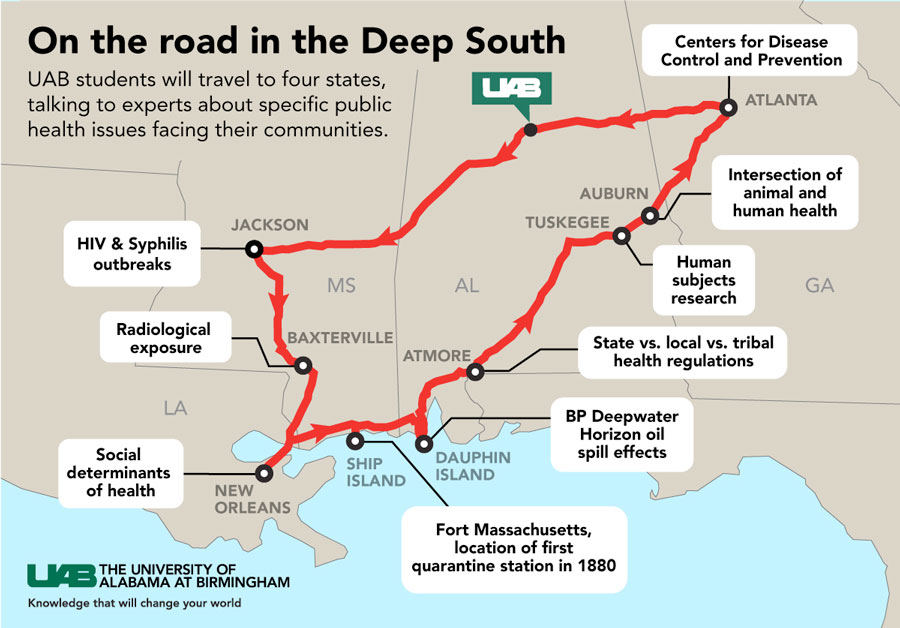Media contact: Alicia Rohan, arohan@uab.edu
 Imagine a class that takes students to a nuclear bomb site to learn about ground cleanup 54 years after detonation. Students in the University of Alabama at Birmingham School of Public Health will get that opportunity and others by registering for a new traveling course in 2018.
Imagine a class that takes students to a nuclear bomb site to learn about ground cleanup 54 years after detonation. Students in the University of Alabama at Birmingham School of Public Health will get that opportunity and others by registering for a new traveling course in 2018.
The course will explore how public health systems are evolving to solve health issues affecting Southern communities in the modern era, as well as how history has shaped the current public health landscape.
“Students will gain perspective of public health issues from people who live throughout our Southern communities and from thought leaders in organizations and agencies in each area,” said Lisa McCormick, Ph.D., associate professor in the UAB Department of Health Care Organization and Policy. “The goal of the course is to expose students to new experiences and illustrate the interdisciplinary nature of public health practice and the need to add attention to the social determinants of health in order to achieve health equity.”
| “In order to effectively practice public health, students must understand the social determinants of health and how they impact population health.” |
Students will travel more than 1,100 miles across four states, and they will visit historically significant sites to hear from experts in various public health disciplines about how to effectively approach issues affecting the population’s health. The course will allow students to look at issues around poverty, pollution, infectious disease outbreaks, chronic diseases, natural disasters and mass casualty disaster response. Officials from local, state, tribal and federal public health agencies in each area will be available to discuss past and current public health issues in relation to each city/state and its unique set of circumstances.
Among the visited sites will be Baxterville, Mississippi, where a nuclear device was detonated in 1964 as part of a government project to further test the effects of nuclear detonations. Students will visit the Salmon Test Site, where the Mississippi State Department of Health’s Division of Radiation Control monitors and addresses public health concerns for the residents in the area.
Other site visits include the Centers for Disease Control and Prevention headquarters in Atlanta and the Lower 9th Ward in New Orleans, which was one of the most affected areas after Hurricane Katrina in 2005. By hearing from experts in New Orleans, students will see how issues of poverty can drastically impact public health concerns in the event of a natural disaster.
“The social, physical and economic environment in which people are born, live and work impacts the overall health of communities,” McCormick said. “In order to effectively practice public health, students must understand the social determinants of health and how they impact population health.”
McCormick will lead the course along with teaching assistant Meena Nabavi, MPH. The class will take place during the May mini-term in 2018. Travel will begin May 13 and end May 25. The registration deadline for the course through UAB Education Abroad is Dec. 1, and space is limited. The course is open to graduate and undergraduate students of any major who have completed their sophomore year. For more information or to apply for the course, contact Lisa McCormick by email at lmccormick@uab.edu.